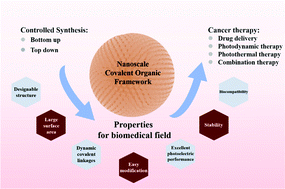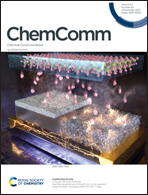Nanoscale covalent organic frameworks: from controlled synthesis to cancer therapy
Abstract
Covalent organic frameworks (COFs), as a new type of crystalline porous materials, mainly consist of light-weight elements (H, B, C, N and O) linked by dynamic covalent bonds to form periodical structures of two or three dimensions. As an attribute of their low density, large surface area, and excellent adjustable pore size, COFs show great potential in many fields including energy storage and separation, catalysis, sensing, and biomedicine. However, compared with metal organic frameworks (MOFs), the relatively large size and irregular morphology of COFs affect their biocompatibility and bioavailability in vivo, thus impeding their further biomedical applications. This Review focuses on the controlled design strategies of nanoscale COFs (NCOFs), unique properties of NCOFs for biomedical applications, and recent progress in NCOFs for cancer therapy. In addition, current challenges for the biomedical use of NCOFs and perspectives for further improvements are presented.

- This article is part of the themed collections: 10th Anniversary of the Youth Innovation Promotion Association of the Chinese Academy of Science and 2021 Emerging Investigators


 Please wait while we load your content...
Please wait while we load your content...